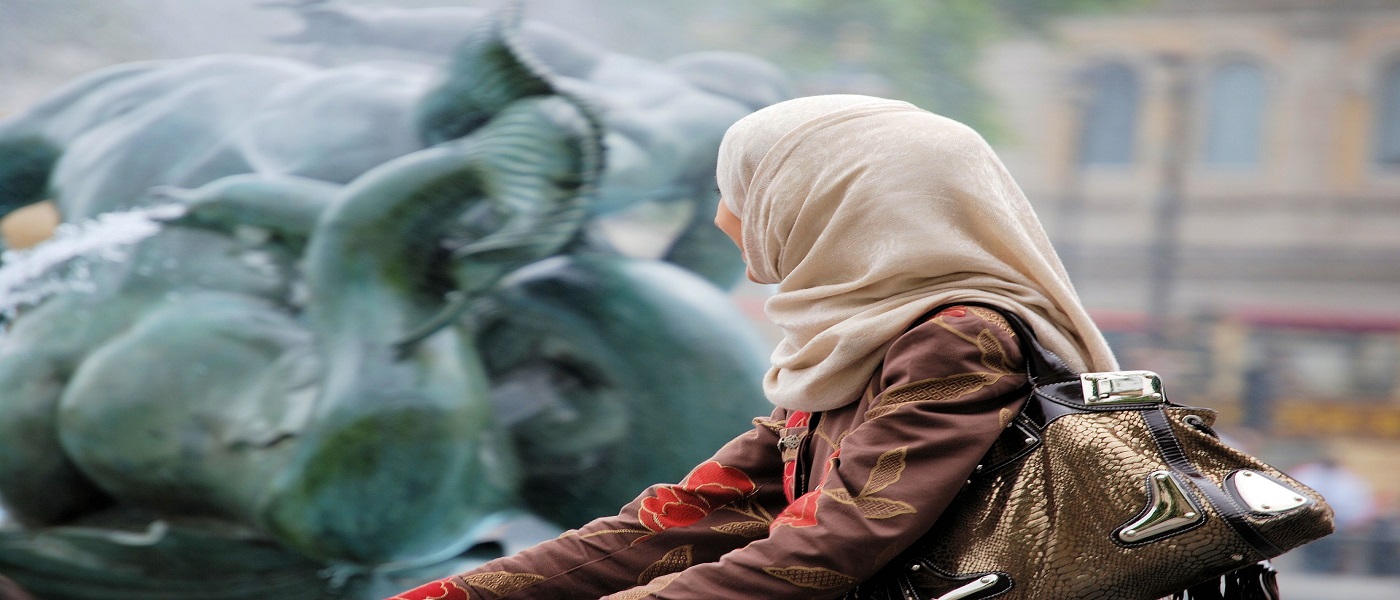

Are Women in Islam Respected as Much as Men?
Contrary to popular belief, women in Islam has been empowered and respected. We previously discussed the Islamic viewpoint on the rights of women and the position of women in the society. Knowing that the justice considers equal rights for both men and women, it revealed that Islam had given “equal” -not similar- rights to women and men. Here, we provide more evidence on the Islamic approach to demonstrate that females are greatly respected in Islam.
Women in Islam and Love for Daughters
In the pre-Islamic era in Arab countries, females were considered as weak members of the society, and they were an economic burden especially during times of famine since they were supposed to be less useful. If a girl was born to a family, the father became disappointed (“And when one of them is informed of [the birth of] a female, his face becomes dark, and he suppresses grief.” (16:58)) and afraid of that girl being held captive by the invaders in the future, which would bring shame to the family. So, they used to bury baby girls alive (“Should he keep it in humiliation or bury it in the ground?” (16:59)).
Of course, Islam prohibited this practice by the divine commands in the Quran as well as the deeds and sayings of Prophet Muhammad (PBUH). The reaction of the Quran to this act is: “evil is what they decide” (16:59) and adds: “do not kill your children out of poverty; We will provide for you and them” (6:151).
This act is so blamed and hated in Islam that in Surah Takwir it is said on the Day of Judgement, the first issue that will be dealt with before everything else will be burying the baby girls alive: “For what sin she was killed” (81:9). This demonstrates how invaluable females are in Islam.
Islam also attempts to show the position of the daughter in the family and how she brings blessings to it. In this regard, Prophet Muhammad (PBUH) has said: “God bless the father who has daughters. Daughters are lovely and bring divine blessing, and sons are like good news. Daughters are enduring good deeds (Baqiyat al-Salihat)” [1].
He (PBUH&HP) wondered why people were unhappy and sorry for having a daughter and said that daughters are like fragrant flowers for him to smell [2]. Imam Sadiq (AS) said that: “Daughters are your good deeds and sons are your blessings. You will be asked for the blessings you have been given, but you will be only rewarded for your good deeds” [3].
This narration emphasizes how important female children and women in Islam are and warns us to treat them well. Prophet Muhammad (PBUH) has advised buying gifts for the family members and said that this act would be rewarded similar to giving charities. Then, he (PBUH) adds: “Firstly give your daughters their gifts, and then your sons. Because whoever makes her daughter happy is similar to the one who has set one of the children of Ishmael free (AS)” [4].
Islam Respects the Wives
The respect and importance given to daughters are also pointed out about women in Islam and especially wives such that according to Prophet Muhammad (PBUH&HP) the best of men is the one who is the best to his wife. And, he (PBUH) is the best man who other men should follow in act and behavior towards their wives [5].
Another manifestation of the respect for the wives is the Islamic point of view on polygamy. Islam does not approve of polygamy; rather it has restricted polygamy by setting some terms and conditions on that matter.
Islamic Advice on Respect for Mothers
Mothers are of high value in Islam because of their efforts such as how they withstand the difficulties during the pregnancy, the care and protection they provide after giving birth to the baby, the selfless sacrifices they make so that the child could grow up in the most comfortable condition and with the best education.
The rights of mothers are even known to be superior to those of fathers [9]. According to Prophet Muhammad (PBUH&HP), one can never pay back the rights of the mother [6].
Last word …
This amount of concern about females from childhood to motherhood and the considerations for the equal rights for women in Islamic teachings all the indicate the respect and attention paid to women in this religion.
References:
- M. Nuri, "Mustadrak al-Wasa'il", vol. 15, p. 115, T. 17700.
- "Makarim al-Akhlaq Supplication", p. 219.
- Shaykh Al-Kulayni, “Al-Kafi”, vol. 6, p. 6.
- Shaykh Al-Amili, "Wasa'il al-Shi'a", vol. 15, p. 227.
- Shaykh al-Saduq, "Man la yahduruhu al-Faqih", vol. 3, p. 443.
- H. T. Nuri Ṭabarsi, “Mustadrak al-Wasail”, vol. 15, p. 203.
Share This Article

Is Islam Opposed to Women’s Sport?
You may wonder why Muslim women do not take part in some sports. Are certain types of sports forbidden (Haram) for women in Islam? Are women in Islam not allowed to enjoy themselves doing such recreational activities? Well, actually the question whether women in Islam can play sports is somehow same as the question if Muslims can eat or drink!!
And the answer is like, of course we can eat and drink! But, Islam always wants us to observe some rulings for our personal or social benefit. For example, drugs or alcoholic drinks that could lead to intoxication are forbidden in Islam, since they are far more harmful to the people and the society than they are beneficial [i]. So we can enjoy all the tasty foods and drink that God has kindly given to us [ii], and we should always be careful not to go further than such limits.
In the same way, we can say that generally speaking; there is nothing wrong with playing sports in Islam, both for men and women. Conversely, Islam encourages us all to do what makes us strong and healthy! [1] Still, there are things to keep in mind since according to Islam, we are not supposed to receive harm, nor to harm others [2].
Take gambling for example, which has become a part of many games and sports today, and which walks many people on the road to their ruin! When playing sports, then, we should take care that it doesn’t include any kind of gambling. The same is with sports which might lead to serious injuries to oneself or another person.
Women in Islam Are not Crossed out!
And how about women in Islam? Is there any special rule for them? Well, women are asked so much to observe Hijab and modesty, both in their covering and manners –as much as men are asked to take care of their sight, and maybe as much as both genders fail to do so! [iii]
Certainly, we know that it’s not really easy to conform to these rules. Women have extremely beautiful and charming bodies, which makes it the more trying for them to hold back the inclination (maybe the same applies to some male bodybuilders who tend to expose their bodies much more than cover it!).
Of course, it is all fine if you can take part in your favorite kind of sport in segregated places where there are no male spectators, or if there can be a special and verified covering for women in Islam, as we see many women doing martial arts, for example, with a headscarf, in order to be safe from sickly looks [iv] and to cherish what God has bidden them at all times.
Think of the Risks and Benefits
Still, you may be interested in a type of sport which finds no way to go along with the Islamic tips on covering and modesty. You think to yourself, “Why can’t I go swimming at mixed pools? I’m not doing anything wrong, just wearing a comfortable suit for swimming! It’s men’s duty not to look at me in a bad way?” Well, quite so.
But what if some of them may fail to do so? Had you not better protect yourself from that? If you go to an outdoor swimming pool in the winter, YOU are not doing anything wrong. But the weather is cold! And regardless of your real intentions, it will harm you anyway! Unless you protect yourself from catching it with a jacket [v].
Think of how women’s body has become a, so to say, cheap commodity today, due to the lack of such considerations in some women. Think of how we could experience less abusive behaviors and more enduring families if all women preserved a certain level of covering and modesty and if all men protected their sight from what they shouldn’t look at [vi] Not to mention the heavenly reward that God has kept in store for those who listen to His instructions, and that is surely greater than the worldly benefit!
Go for It!
If you have made up your mind to live as a practicing Muslim, you be sure that you are doing the right thing, no matter what others say, and no matter what the circumstances. You can also be sure that God loves you very much for taking the trouble! And it never means that a Muslim woman who fails to do so is excluded from the Islamic Community (Ummah) and God’s mercy.
So, to sum up, what we said, Islam has no opposition to women’s sport. It just asks them to be modest before everyone and covered before non-Mahram men. If they think that the kind of sport they are to take up conforms to these suggestions, which a good many sports does, they can go for it without any restriction.
And if it doesn’t, they can find a way which goes closest to what God requires of them, or maybe they can think again and pick another type of sport for themselves.
Notes:
[i] Quran, 2:219
[ii] Quran, 7:32
[iii] Quran, 24:30,31
[iv] Quran, 33:32
[v] You can read more about “the Islamic Etiquette of Looking” here.
[vi] You can have a look at our article about “Hijab” here.
References:
- Bihar al-Anwar, vol. 78, p. 174, Sahih al-Muslim, vol. 4, no. 2052
- Wasa’il al-Shi’a, vol. 26, p. 14, Al-Mu’jam al-Awsat, vol. 1, p. 90
Read More

What are the social rights of women in Islam?
Some people who are not well acquainted with the true Islamic teachings think that Islam has not provided for all Muslims equal social rights. And on account of the fact that Islam has made some distinctions between men's and women’s rights they conclude that the same distinctions are made in their social rights. As a result, the picture of women in Islam to them is usually the stereotype of an oppressed, inferior figure and bereft of any right.
The Concept of Gender Equality in Society
Islam is the religion of equality and gender is not a standard for the preference of one over another. In fact, Islam has not only taught the equality of all humans before God but also promoted it in the social sphere. Consequently, in the Islamic social system men and women are granted equal rights and there is no difference between them about their gender.
But, the point is that “equality” does not mean the “similarity” of their rights, since men and women are not identical to one another in many respects [1]. Therefore, we can deduce, although through comparing their rights a kind of disparity appears at the individual level, both of them privileges equal rights on the social scale.
The concept of women’s equal social rights is practically extended in all aspects of social life, and meanwhile, the “equality” does not reflect the meaning of “sameness.” Instead, it means that their social rights are equated in the matters related to self-worth and individual value to those of men.
Women’s Rights & The Right of Seeking Employment
Women are given a free hand to choose the occupation they want. But they have to note that their occupations should neither be incompatible with their physical and spiritual characteristics [2] nor in conflict with their duties towards their families.
This is why Islam has absolved them from providing for the family in the first place so that they become able to take care of their household as best as possible [3]. However, they are entitled to receive a fair wage by their works either outside the house from their employers or inside the house from their husbands if they ask for it [4].
The Right of Traveling and Activity in An Ethical Society
There is no restriction on women traveling alone if it is not inconsistent with the interests of their families. And regarding their social presence, it is a women’s right to be protected from men’s malicious eyes, whose obligation is casting his eyes down towards them [5].
The Social Security, Juridical and Political Rights of Women in Islam
In the Islamic social system, an equal emphasis is given to women for benefiting from social security systems and social services [6]. Also, women’s right in benefiting from Islamic legal and juridical systems is equally safeguarded.
Many stories from the early period of Islamic history deal with women who referred their disputes to the Prophet (PBUH&HP) in the same way as men sought his judgment [7]. Moreover, not only they share the right of election and the nomination to political offices with men but also can access the highest levels of political authority due to the Islamic laws, provided that it is not inconsistent with their physical and spiritual capacities and their responsibilities towards their families [8].
The Right to Have Education
This right is so much important that Prophet Muhammad (PBUH&HP) once commanded that even slaved girls should be educated [9] and in one famous narration he considered seeking knowledge an essential task for both sexes [10].
Women’s Social Obligations
In the light of the above facts, we can conclude that the idea of inferiority of the social status of women in Islam to men is void and baseless. However, as it was mentioned earlier, men's and women’s social rights are “equal” and not “similar” due to great differences between their characteristics.
That is why the social obligations of women in Islam are narrower than those of men; as Islam has exempted them from the burden of providing maintenance for the family [11] and even some religious practices.
References:
- Mutahhari, Murtadha, The Rights of Women in Islam.
- Amini, Ibrahim, An Introduction to the Rights and Duties of Women in Islam.
- Penny, Sue, Islam, p.39.
- Lois, Beck, Women in Iran from 1800 to the Islamic Republic, pp. 165-166.
- Muhammad Javad, Bahonar, Islam and Women’s Rights.
- Universal Islamic Declaration of Human Rights; this article is available at https://www.whyislam.org.
- Johnson, Andy, Religion and Men’s violence against Women, pp. 322-325.
- Mahmudi, Hassan, Issues in Women’s rights: A Practitioner’s Resource Book, p. 47.
- Nasir, Jamal, The Statue of Women Under Islamic Law and Modern Islamic Legislation, p. 15.
- social rights
- Cornell, Vincent, Voices of Islam: Voices of life: family, home, and society, p. 85.
Read More

